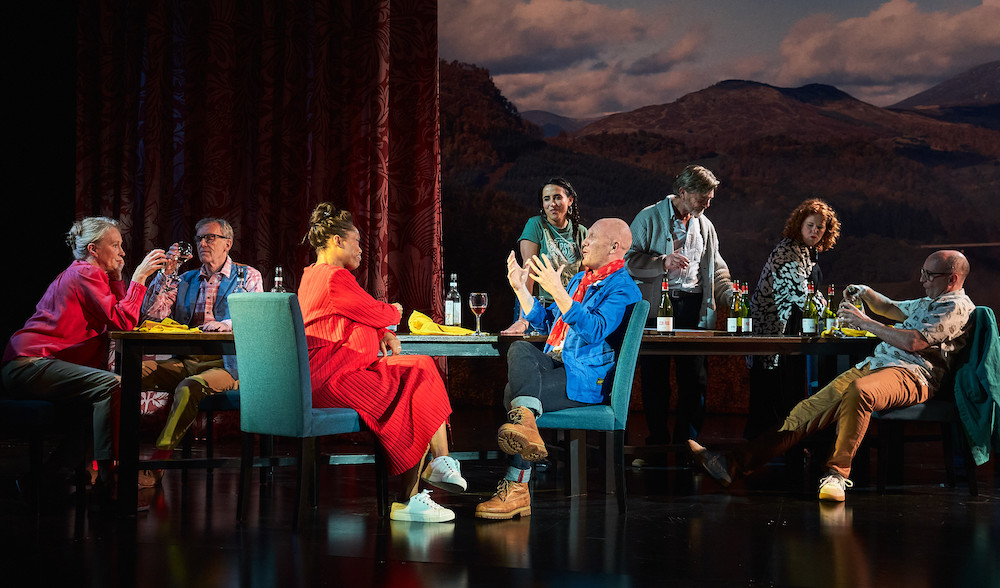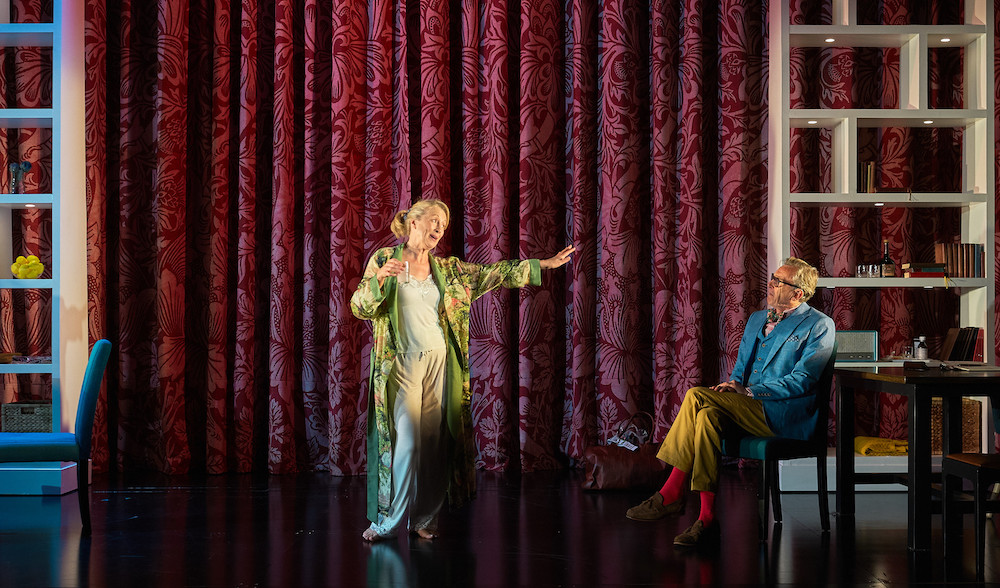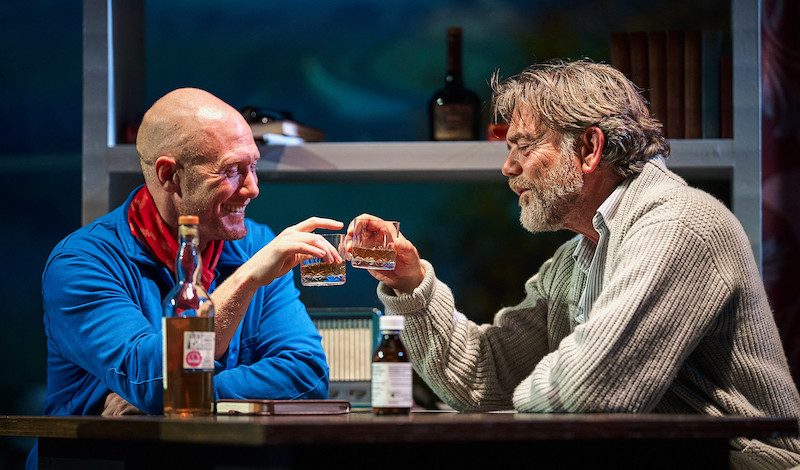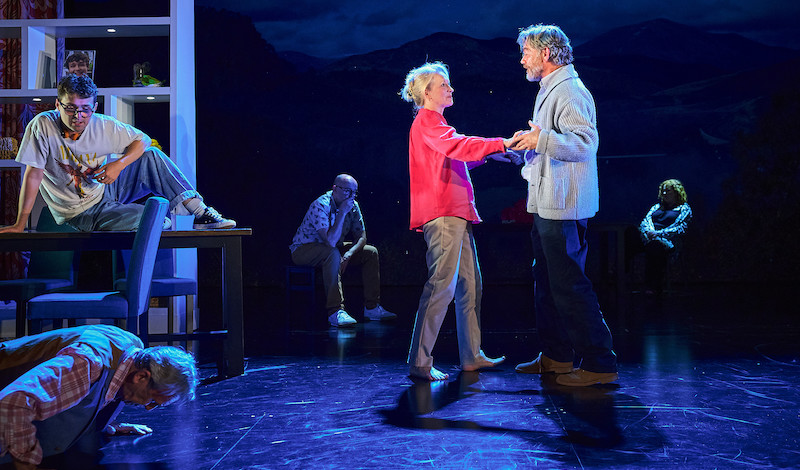Group Portrait in a Summer Landscape
★★★★☆ Philosophical weight
Royal Lyceum Theatre: Wed 4 – Sat 14 Oct 2023
Review by Hugh Simpson
Group Portrait in a Summer Landscape at the Lyceum deals unapologetically with difficult emotional and political themes, eschewing any easy answers or resolutions in a way that could be tricky, but is made palatable by performances of power and nuance.
In Peter Arnott’s new play, first seen at Pitlochry Festival Theatre, politically engaged academic George Rennie has invited family and friends to his Perthshire retreat for a dinner to celebrate his upcoming retirement on the eve of the 2014 independence vote.
The referendum may be the setting, but does not prove to be the sole focus, as other political, philosophical and personal matters move to centre stage.
This leads to a somewhat diffuse feel, particularly in the second half, after an opening that is much more taut and deftly sketched in. The play’s stated aim of being ‘Scottish Chekhov’ is probably too much of a weight for it to bear, and the various strands and questions never quite knit together. This means that it frustrates as much as it fascinates.
Such frustrations are easily pushed aside, however, as Arnott’s dialogue is always punchy and considered, and performed by an admirable cast. John Michie has considerable power as Rennie, once the shining light of academia, but now disenchanted and worn out.
believability
Deirdre Davis, as his semi-estranged spouse Edie, has a similar power and believability, with a desperate sadness only just kept at bay.
Sally Reid is also very fine as their daughter Emma, whose dropping out of Cambridge has never ceased to be a disappointment to her father. Emma’s sidelining was only increased by the death years previously of her brother Will, who remains very much a physical presence as played by Robbie Scott with a distracted, otherworldly air.
Despite the many tricky questions the play raises, it always seems to come back to the family dynamic – those things that are never said, and what Larkin famously said all parents do to children. In particular, it lays bare what happens when parents project their hopes on to the next generation, and the fallout when the children cannot or will not fulfil them.
In many ways the other characters are adjuncts to the family drama – Frank the former student, now colleague of Rennie, and his fiancee Kath, a starry-eyed supporter of independence; Charlie, another ex-student, once Emma’s husband and now a rabble-rosing television personality, and his new Czech girlfriend Jitka.
plausible
That these characters do not appear dispensable is down to the efforts of the other performers in an excellent ensemble. Patricia Panther gives activist Kath a combination of idealism and steeliness, Keith Macpherson is extremely plausible as the conflicted Frank, and Nalini Chetty’s Jitka has more subtlety than might easily have been the case.
Charlie, meanwhile, obviously considers himself to be a Nietzschean Übermensch with his liberal-baiting, climate emergency-welcoming populism tinged with neo-Nazism; that he does not come across as more of a Laurence Fox wannabe is down to the commitment of Matthew Trevannion’s performance.
And there is certainly no question of the indispensability to the production of Benny Young’s Jimmy Moon. What could be a stock figure – the extravagantly camp actor bemoaning the passing of the years and his ‘exile’ in Hollywood – becomes the moral centre of the play, thanks largely to the combination of emotional attentiveness and genuine relish that Young brings to the role.
There are moments in the play where Arnott flirts with dramatic disaster – fractured time schemes, the intrusion of the supernatural, the piling up of philosophical conundrums with no answer – but it all gels very convincingly, thanks in no small part to the direction of David Greig, which is remarkably assured and fluent.
impact
The sound design of Pippa Murphy and lighting design of Simon Wilkinson aid greatly in the transitions between states of varying naturalism, and are extremely impressive throughout.
Jessica Worrall’s design also has great impact, with its towering curtains and shelving filled with cross-decade bric-a-brac. The huge picture of Perthshire on the back wall is less successful, evoking nothing so much as Hilda Ogden’s legendary ‘Muriel’ at Number 13 Coronation Street.
It still works far better than it has a right to, which is also true of the moment when Rennie, seeking to find something ‘good’, puts on John Coltrane’s A Love Supreme. This invocation of great art (like Charlie’s mentions of Mozart) often has the opposite to the desired effect, diminishing rather than enhancing its surroundings. Here the combination of Murphy’s sound design (with authentic scratched-vinyl sounds at the start of the piece) and Michie’s reaction makes it utterly believable and affecting.
Which is true of most of this. It may be so open-ended that it seems like the opening of a trilogy rather than a complete play, but the intelligence of the dialogue, coupled with the excellence of the cast and production, make it a compelling spectacle.
Running time 2 hours 5 minutes including one interval
Royal Lyceum Theatre, Grindlay St, EH9 3AX
Wednesday 4 – Saturday 14 October 2023
Tue – Sat at 7.30 pm; Matinees Wed, Sat at 2.30 pm
Details and tickets: Book here.
ENDS






















